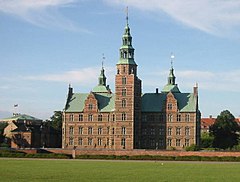Rosenborg Castle
| Rosenborg Castle | |
|---|---|

Rosenborg Castle seen from the Castle Gardens
|
|
|
|
|
| General information | |
| Architectural style | Dutch Renaissance |
| Town or city | Copenhagen |
| Country | Denmark |
| Coordinates | 55°41′08″N 12°34′40″E / 55.68556°N 12.57778°E |
| Construction started | 1606 |
| Completed | 1624 |
| Client | Christian IV |
| Design and construction | |
| Architect | Hans van Steenwinckel the Younger, Bertel Lange |
Coordinates: 55°41′8″N 12°34′40″E / 55.68556°N 12.57778°E
Rosenborg Castle (Danish: Rosenborg Slot) is a renaissance castle located in Copenhagen, Denmark. The castle was originally built as a country summerhouse in 1606 and is an example of Christian IV's many architectural projects. It was built in the Dutch Renaissance style, typical of Danish buildings during this period, and has been expanded several times, finally evolving into its present condition by the year 1624. Architects Bertel Lange and Hans van Steenwinckel the Younger are associated with the structural planning of the castle.
The castle was used by Danish regents as a royal residence until around 1710. After the reign of Frederik IV, Rosenborg was used as a royal residence only twice, and both these times were during emergencies. The first time was after Christiansborg Palace burned down in 1794, and the second time was during the British attack on Copenhagen in 1801.
Located on the third floor, the Long Hall was completed in 1624. It was originally intended as a ballroom. Around 1700 it was used as Royal Reception Room and for banquets. It was not until the second half of the 19th century that it became known as the "Knight's Hall".
...
Wikipedia

